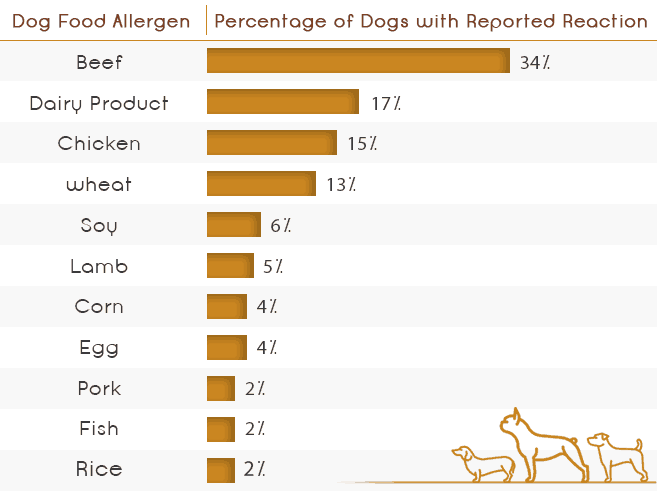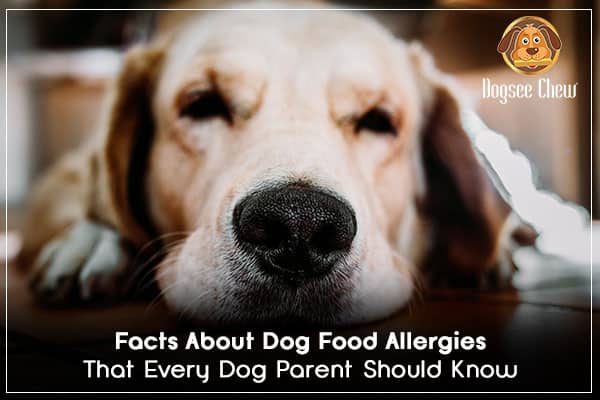Has your dog been itching, scratching or biting his/her fur a lot recently? Well, chances are that he/she may have contrived an allergy. Understanding your dog’s behaviour can be a tough thing sometimes since they don’t have the verbal capability to express themselves. You may have noticed some changes in their behaviour like they have started itching/scratching or biting their fur. Sometimes even after altering several things like grooming habits and taking medications, the problem doesn’t go away. If this is the case, your dog probably has a dog food allergy.
Did you know? Diet can be one of the most important factors that can trigger allergies in dogs. Although it’s believed that food allergies cause only digestive problems like diarrhoea and vomiting, but they are also a major contributor to skin and behavioural problems.
Understanding food allergies in dogs can be a little confusing. That’s why we dedicated this blog to cover the various aspects of dog food allergies. In case your dog does has an allergy, it’s best to immediately consult a vet.
Let’s first begin by understanding what dog food allergy means.
What is a Dog Food Allergy?
Dog food allergies occur when your dog’s immune system mistakes a protein in his/her food for a foreign substance and resists it. Most often, your dog won’t be allergic to a specific brand of food but rather a specific ingredient in the food.
The most common ingredients that cause allergies in dogs are animal proteins. Contrary to the popular notion which holds fruits and vegetables responsible for most allergies, it’s animal proteins like chicken, beef, dairy, egg, and fish that are more prone to trigger allergic reactions in your dogs.
Although dogs with digestive problems can switch to a grain-free diet, however, the root cause of the problems is more proteins than grains.
However, it’s important to understand the difference between dog food allergy and a dog food intolerance.
Dog Food Allergy Vs. Dog Food Intolerance
In case of a dog allergy, it’s often the food protein that causes an adverse response in the immune system that forces the cells in the body to create histamines that cause itching.
There is no immune response, on the other hand, in the case of a dog food intolerance. The symptoms, however, are similar to that of a dog food allergy. Some of the common things that can trigger a dog food intolerance are excessive fat in diet, grains or even dairy intake.
Common Food Allergens in Dogs
It’s possible for dogs to develop allergies at any age - as young as 5 months old to as old as 12 years of age. There are several ingredients that can trigger allergies in dogs. Some are more prone to cause allergies than others. For example, the ingredients most likely to cause allergies in dogs are beef, grains and dairy whereas the ones least likely to cause allergies are fish and rabbit. This chart depicts the common allergens causing food allergies in dogs and how much of a reaction they have on them.

Although all dogs can develop allergies, however, some breeds are more liable to develop food allergies than others. Here are the breeds who are more at risk of developing food allergies:
- Cocker Spaniel
- German Shepherd
- Dalmatian
- Collie
- Boxers
- Golden Retriever
- Daschund
- Westies (West Highland White Terriers)
- Yorkies (Yorkshire Terriers)

Facts About Dog Food Allergies
Here are some important facts to remember about dog food allergies:
Single Allergies are Rare
As per estimates, more than one-third of dogs are allergic to more than one ingredient.
Starches Are Safer For Dogs
If you are feeding your dogs pure carbohydrates, or starches, then there are fewer chances of them developing allergies because they contain lesser or almost nonexistent proteins. There are exceptions like potato starch, high-protein grains like corn, wheat etc.
Pure Fats Are Safe Too
There are many pure fats like pure fish oil which don’t contain protein. But in some cases, traces of protein can pass into the fats during processing and can cause trouble for dogs which are highly allergic.
Be Careful About Gelatin
Some supplemental oils are packed in gelatin which can cause allergies in dogs.
Peanuts Rarely Cause Allergies
If your dog loves peanut butter, then this is good news for him/her. Cases of peanuts causing allergies in dogs are rare. Even if there are a few, the severity of the allergies is far lesser than other ingredients.
Stay Away From By-products
Animal by-products like rawhides can trigger severe allergies in dogs since they contain lots of artificial flavourings, preservatives and chemicals.
If you find that your dog has developed an allergy, then you must take him/her to a vet immediately. Dog food allergies can turn out to be quite serious in the long run if not addressed properly. Apart from severe itching and other skin problems, it can also lead to malnutrition. This happens when the immune system starts to attack the cells in your dog’s digestive tract that affects its ability to digest and absorb nutrients. Food allergies in your dog generally get heightened with time as your dog becomes hypersensitive to the ingredient that’s causing the allergy. Often, it’s the case that a dog who is allergic to one ingredient is also allergic to other ingredients as well.
Dog food allergies need immediate attention and treatment so that they don’t turn into bigger problems later. Being aware of the facts regarding allergies concerning dog food will help you to take the right decision towards the proper treatment to alleviate the allergy.
